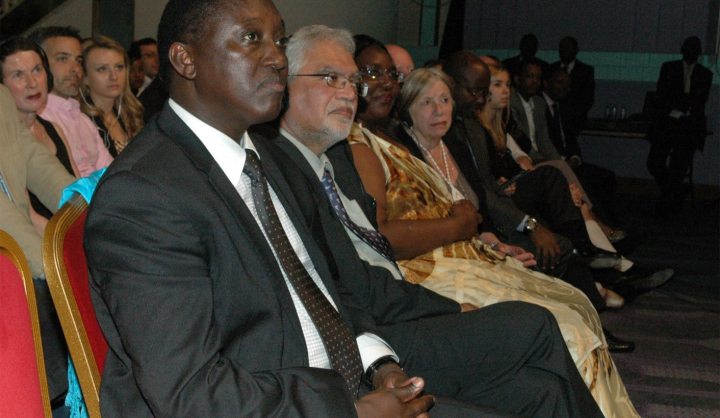He might not be a president, but Rwandan spy chief Karenzi Karake is still a very big fish. His arrest in London, on a Spanish warrant, could precipitate another crisis for international justice. A word of gratuitous advice for the British authorities: this one’s delicate. Handle with care. By SIMON ALLISON.
Another day, another crisis for international justice.
First it was the arrival of Sudanese President Omar al-Bashir on South African soil, and South Africa’s ensuing failure to arrest him – defying both the International Criminal Court and South Africa’s own judiciary in the process.
Then it was the arrest in Germany of Al-Jazeera journalist Ahmed Mansour, detained at the airport in Berlin at the request of the Egyptian government. Egypt had convicted Mansour in absentia for allegedly torturing a lawyer in Tahrir Square in 2011, and sentenced him to 15 years’ imprisonment. On Sunday, Mansour was released without charge, with the Germans citing diplomatic, legal and political concerns that could not be ignored (presumably, these have something to do with the Egyptian military regime’s notorious lack of respect for the judicial process, especially when it comes to journalists).
Finally, news broke on Tuesday that Rwandan spy chief Lieutenant-General Emmanual Karenzi Karake, head of the notorious National Intelligence and Security Services, had been arrested in the United Kingdom while trying to depart from Heathrow. Karake is one of 40 Rwandans indicted by a Spanish judge in 2008 for allegedly ordering revenge massacres in the wake of the Rwandan genocide in 1994. If the process gets that far, it will be to Spain that Karake is extradited.
The three cases represent three very different facets of international justice. Bashir’s is an example of the top-down approach, where an international body investigates and prosecutes international crimes; Mansour’s is an example of the national approach, where bilateral agreements and coordinating bodies like Interpol help countries enforce their national laws in other jurisdictions; and Karake’s is an example of universal jurisdiction in action.
“The term ‘universal jurisdiction’ refers to the idea that a national court may prosecute individuals for any serious crime against international law — such as crimes against humanity, war crimes, genocide, and torture — based on the principle that such crimes harm the international community or international order itself, which individual States may act to protect,” explains the International Justice Resource Centre.
The majority of states (163 of the 193 UN member states, according to Amnesty International) provide for some kind of universal jurisdiction, but few exercise it. Spain is a notable exception. Spain has actively prosecuted international crimes committed in faraway jurisdictions such as Argentina, El Salvador and Guatemala – and, of course, Rwanda.
Karake’s arrest is a major test of universal jurisdiction in action, and there are enough allegations surrounding him to suggest that he should have his day in court. As well as the charges relating to the post-Rwandan genocide massacres, Karake is implicated in the killing of hundreds of civilians in the Democratic Republic of Congo during fighting between Rwandan and Ugandan forces.
(Coincidentally, given the current comparisons with Bashir, Karake was appointed in 2007 to head the African Union/United Nations hybrid mission in Darfur, with strong backing from the US and UK. Bashir, of course, is wanted by the ICC on charges of committing genocide in Darfur).
Although the legal case for Britain to extradite Karake to Spain is solid, there are political considerations that might get in the way.
The most significant is the close relationship between Britain and the Rwandan government. Rwanda is a major destination for British aid, and President Paul Kagame is advised by former British Prime Minister Tony Blair. Already, Rwanda is putting on heavy diplomatic pressure to secure Karake’s release, with its ambassador the UK describing the arrest as “an insult”. But the British government won’t be able to ignore its courts in the South African manner. Should Karake’s arrest warrant be in order, and all procedures properly followed, it’s going to be difficult to prevent his extradition.
Which begs the question: why was Karake detained in the first place? According to media reports, Karake has made several trips to Britain since 2008, and he has been permitted to leave each time. This implies either that something has changed – most likely, that the furore around Bashir’s non-arrest forced Britain’s hand – or that some border official was a little over-zealous in the execution of his duties, and now it’s too late for anyone to turn a blind eye.
Another factor that the politicians will be considering is the ramifications that extraditing Karake will have on the already strained relations between the African continent and international justice. It will be a public relations coup for African leaders looking for further justification that they are being unfairly targeted by the West. While there are sound reasons for the German court to have released Mansour, and for a British court to extradite Karake, these decisions could just as easily be portrayed as western judiciaries choosing to enforce western arrest warrants (in the case of Spain and Karake) while refusing to enforce African justice (in the case of Egypt and Mansour).
Britain, in other words, is in an extremely delicate position. If it does go ahead with extradition proceedings, and eventually extradite Karake to Spain, it risks angering an important ally and alienating a continent – while giving self-interested leaders more fuel for their claims of western bias in international justice. If it doesn’t, it will have to defy its own rule of law, potentially dealing a crippling blow to the concept of universal jurisdiction in the process. It’s a legal and political minefield, complicated by a diplomatic storm that shows no signs of letting up anytime soon. No one ever said international justice was easy. DM
Photo: Karenzi Karake in London, on Rwanda Day. (Photo by Jambo News)
Read more:
-
Rwandan spy chief Karenzi Karake arrested in London on BBC



















 Become an Insider
Become an Insider